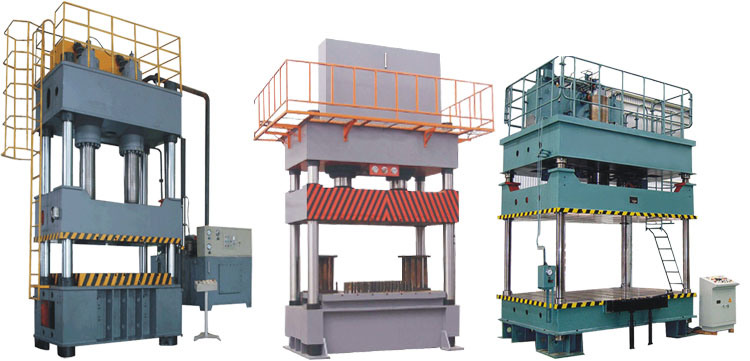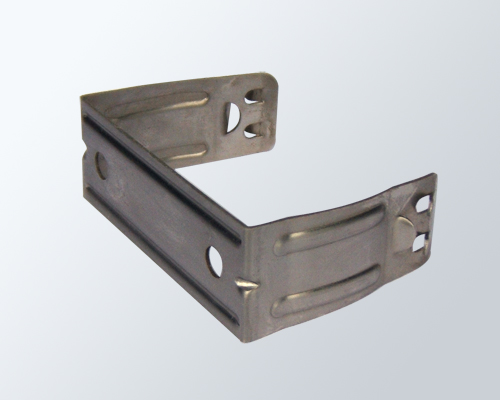250t 4 Post Hydraulic Press Machine
Building a stainless steel product from the ground up involves a lot of work, technology and science. Even though there are billions of users of stainless steel items around the world, there are very few people (relatively) who know what goes into making a stainless steel product from scratch. The manufacturing process of a stainless steel product is indeed fascinating and it gives you an insight into how far our ability to craft materials has evolved since the early days of the Industrial Revolution. Here are the six most important steps in the manufacturing process of a stainless steel product:  1) Material handling Uncoiler-A material handling machine located at the beginning of a process line used to hold and safely pay off or uncoil the steel strip. It controls the speed and direction of the strip of metal as it unwinds from the coil and is sent to the line for processing, such as slitting or tube mill entry.  2) Forming Deep drawing press- In the second stage, the semi-finished steel shapes undergo a series of forming operations. For instance, the stainless steel is hot rolled (heated and passed through enormous rolls). The blooms and billets mentioned above are converted to bar and wire. The slabs on the other hand are formed into plates, strips or sheets. It is very common to turn semi-finished steel shapes into bars, as it is the most versatile stainless steel form. The reason why it is versatile is because it comes in all grades and sizes. You have round, squared, octagonal and hexagonal bars, each suitable for a different type of application.  3) Heat Treatment Annealinf furnaces- Up next we have the heat treatment. As the name clearly suggests, the various stainless steel forms undergo a thorough annealing process during this step. Annealing is another name for heat treatment where the stainless steel is heated and cooled in a controlled environment. The purpose of this heat treatment is to relieve the pent up stress inside the stainless steel and soften the material to make it more suitable for a wide variety of applications. The people in charge of carrying out the annealing process have to be very careful about control the conditions as even the slightest of changes in the temperature, pressure, duration or cooling rate could result in a faulty product.  4) Descaling Pickling- During the annealing process, a certain amount of scale appears on the surface of the stainless steel. This scale can be removed using a number of different processes that are collectively known as descaling. Pickling is one of the more common methods of carrying out the descaling process.  5) Cutting and Punching The semi-finished, heat treated and descaled stainless steel forms are cut into specific shapes in this step. Mechanical cutting is performed with the aid of guillotine knives, blanking, nibbling and high speed blades. And in this step, the tap hole and the over flow will be made.  6) Finishing and Polishing Polishing machine- Finishing is applied to help the stainless steel product achieve its signature aesthetically appealing appearance. Finishes are also needed to make the stainless steel product smooth and easier to clean, which is a top requirement in sanitary applications. Hydraulic press 4 column hydraulic Sheet metal deep drawing Features 1.Hydraulic machine that used the hydrostatic pressure to process metal, plastic, rubber, wood, powder and other products . 2. It is commonly used in the pressing process and press forming process, such as: forging, stamping, cold extrusion, straightening, bending, flanging, sheet metal deep drawing, powder metallurgy, press-fit etc. 3.Significant technical and economic advantages in reducing weight, reducing the number of parts and the number of molds, improve the stiffness and strength, reduce production costs, etc.
The processing method for stamping and
forging are plastic processing (or pressure processing), forging stamping blank
collectively. Is hot-rolled and cold-rolled steel sheet and strip. The world of
steel, 60 ~ 70% is the plate, mostly made by stamping products. Automobile
body, chassis, tank, radiator, boiler drum, vessel shell, electric machine,
electric iron core silicon steel sheet are stamping processing. Instruments,
household appliances, bicycles, office machinery, household utensils and other
products, there are a large number of Stamping Parts stamping. Is powered by
conventional or special punching equipment, make sheet metal in the mold
directly affected by the deformation force and deformation, thus A certain
shape, size and performance of the product parts production technology. The
sheet metal, mold and equipment are the three elements of stamping. Temperature
divided by stamping hot stamping and cold stamping. The former is suitable for
high deformation resistance, sheet metal plasticity is poor; the latter was
carried out at room temperature, is commonly used in stamping method the sheet
metal plastic processing. It is (or pressure processing) one of the main
methods, but also forming part of materials engineering. Stamping mold called
stamping die, or die. The die is the material (metal or non-metal) batch
processing into the special tool stamping. Die is of vital importance in the in
the press, did not meet the requirements of the die, it is difficult to carry
out production batch stamping die; no advanced, advanced stamping process can
not be achieved. The stamping process and die, stamping equipment and stamping
materials to constitute three stamping processing Only when they combine with
each other can they get the stamping parts.
WHY
Stamping:
Stamping parts and castings, forgings, a
thin, uniform, light, strong character. Stamping can be produced from other
methods is difficult to manufacture with stiffeners, stamping parts stamping
rib, rolling or burring of the workpiece, to improve its rigidity. Because of
the use of precision molds, workpiece precision, and high repetition accuracy,
specifications, can punch a hole nest, boss. Cold stamping generally no longer
cutting machining, or only a small amount of cutting. The hot stamping
precision and surface state below the cold stamping, but still better than the
casting, forging, machining less.
(1) Stamping processing is of high
production efficiency, convenient operation, easy to realize mechanization and
automation. This is because the stamping dies and stamping equipment rely on to
complete the processing, ordinary press trips per minute up to dozens of times,
high pressure per minute up to hundreds or even thousands of times, and each
press stroke you may get a red piece.
(2) The stamping die ensure the dimension
and shape precision stamping parts, and generally do not damage the surface
quality of stamping, and die life is generally longer, so the stamping quality,
good interchangeability, "as like as two peas" feature.
(3) Stamping can press the processing size
range is large, complex shape parts, such as a small clock stopwatch, large car
rails, covering parts, stamping and material hardening effect of cold
deformation, punching strength and stiffness are higher..
(4) Stamping generally without cutting
scrap generated, material consumption is less, and no other heating equipment,
which is a kind of material saving, energy saving and processing, lower the
cost of stamping parts.
Category:
Stamping is mainly according to the process
of classification, can be divided into separation process and the forming
process of two categories. The separation process also known as blanking, its
purpose is to make the stamping parts along the contour line must be separated
from the sheet, and guarantee the quality of the separation section (Table 1).
The forming process is designed to make sheet metal in broken slab under the
condition of plastic deformation, the workpiece into the required shape and
size. In the actual production, often a variety of integrated process applied
to a workpiece. The blanking, bending, shear, tensile, bulging, spinning,
correction is the main stamping process of several.
Mainly speaking,based on the three
different material,we can make steel stamping farts,copper alloy stamping parts
and aluminium alloy stamping parts.
Stamping Parts Stamping Parts,Steel Stamping,Copper Stamping,Aluminium Stamping VESTA Motoring Ltd , http://www.vesta-industry.com
SPECS of Yz32
Â
Model Â
unit
Yz32-40
Yz32-63
Yz32-100
Yz32-160
Yz32-200
Yz32-250
Yz32-315
Yz32-500
Yz32-630
Yz32-800
Yz32-1000
Yz32-1600
Yz32-2000
Yz32-3150
Nominal Force
KN
400
630
1000
1600
2000
2500
3150
5000
6300
8000
10000
16000
20000
31500
Ejection force
KN
63
100
250
250
400
400
630
1000
1000
1250
1250
1600
2000
3150
Max working pressure of liquid
Mpa
26
25
25
25
25
25
25
25
25
25
25
25
25
25
Max. open height
mm
400
600
800
900
1000
1000
1250
1400
1500
1500
1500
1600
1800
2500
Slider strokeÂ
mm
300
400
600
700
700
700
800
900
900
900
900
900
1000
1200
Ejection stroke
mm
140
160
200
250
250
250
300
300
300
350
350
450
450
500
Slide speed
Down
mm/s
40
40
100
100
100
120
120
120
120
120
120
150
150
300
Pressing
mm/s
8~15
8~15
8~15
8~15
8~15
8~15
8~15
8~16
8~17
8~18
8~19
8~20
8~21
8~22
Return
mm/s
60
60
80
80
80
80
90
80
80
80
100
120
120
250
Table size
Left-right
mm
350
450
600
800
800
800
1200
1400
1600
1600
1800
1800
2000
2800
Front-back
mm
350
420
600
700
800
800
1200
1400
1600
1600
1600
1600
2000
2000
Overall dimensions
Left-right
mm
1200
1300
2000
2200
2200
2200
3300
3500
3700
3700
4000
4200
4500
5800
Front-back
mm
700
800
1000
1000
1200
1200
1600
1600
1800
1800
1800
2000
2000
2000
Height
mm
1930
2350
3200
3300
3500
3700
4800
5000
5300
5700
5800
6000
Stamping
Parts:
